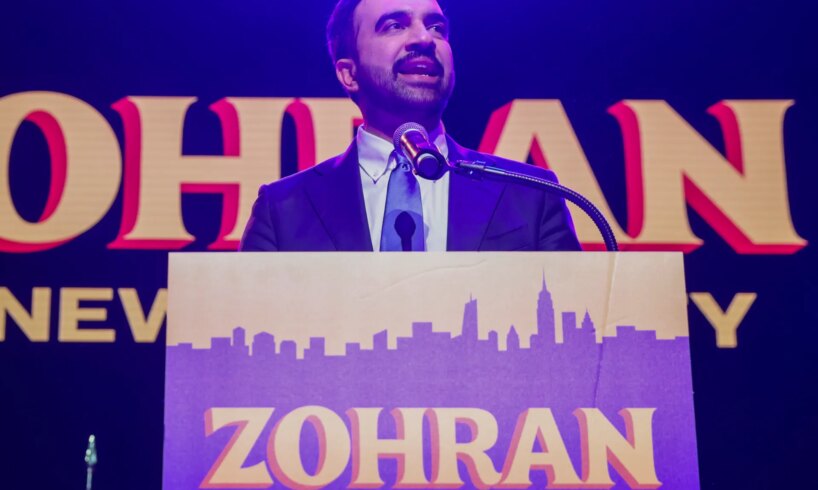
In an astonishing victory, 34-year-old state legislator Zohran Mamdani won New York City’s mayoral election. Defeating former state Governor Andrew Cuomo, who enjoyed strong backing from US President Donald Trump and the political establishment, Mamdani became the city’s first Muslim immigrant mayor and its youngest in more than a century. The democratic socialist’s victory sent shock waves through national politics, emboldening progressives across the country to run and to win on agendas as unapologetically ambitious as the moment demands.
Campaigning across the city, Mamdani reached out to various social groups, including African Americans, Muslims, Jews, Hindus, East Africans and South Asians, and especially the youth, many of whom had grown politically disengaged after the Democratic Party’s demoralising performance in recent years. He brought people back into the political process, mobilising voters who otherwise might have stayed home.
Running on a platform calling for a more equitable distribution of wealth through higher taxes on the super-wealthy, a more affordable and accessible housing market, a free and faster public bus system, and universal, no-cost childcare for children from six weeks to five years old, Mamdani has brought into the mainstream a political discourse centred on equity, one the nation has arguably not witnessed since Eugene V Debs, the early 20th-century socialist organiser and five-time presidential candidate who championed workers’ rights and economic justice.
When asked live on television what “democratic socialist” means, Mamdani replied: “When we talk about my politics, I call myself a democratic socialist in many ways inspired by the words of Dr [Martin Luther] King [Jr] from decades ago who said, ‘Call it democracy, or call it democratic socialism. There has to be a better distribution of wealth for all of God’s children in this country.’”
But what, really, is “democratic socialism”? To many, the term “socialism” evokes the economic system of the former Soviet Union, characterised by inefficient allocation of resources, state control and ownership of productive assets, and political repression under a brutally totalitarian regime. Yet that is not what socialism means.
As the late Erik Olin Wright, one of the most influential sociologists of the past half-century and a pioneering scholar of class analysis in capitalism, detailed, what was practised by the Soviet Union was not socialism but “statism”, an economic system in which state incumbents control investment and production through a centralised planning apparatus. Indeed, in common parlance, most people use the term “socialism” to describe what is most accurately referred to as statism.
Over the past century, struggles for more equal alternatives to capitalism have been waged under the banner of “socialism”. Yet the term itself has long been contested, its precise meaning the subject of intense debate both within and without the academic and policy circles.
If nothing else, Karl Marx himself saw socialism as grounded in two essential principles. First, it required the democratisation of not only political life, which refers to the procedural democracy exercised in most developed countries, but also economic life, so that ordinary workers have a voice in how economic resources are distributed. Second, socialism envisioned a reduction in working hours, so that people could cultivate their creative capacities outside the workplace. Indeed, Marx’s critique of capitalism stemmed largely from his belief that it curtails “human flourishing and self-actualisation”.
Yet the socialist experiments of the 19th and 20th centuries across the world bore no resemblance to these humanistic ideals. Socialism, once seen as an economic system that would extend democracy into realms capitalism would never allow, turned into a centralised, grossly inefficient, and authoritarian state apparatus of command and control of both the economy and society. Soviet-style dictatorships rife with corruption and venality turned socialism into a vehicle for state domination rather than human liberation. With shortages, rationing, and long lines in stores, socialism came to be seen by the 1980s as a failed project of social transformation in the places where it was implemented.
So, what is “democratic socialism”?
The term is composed of two words: “democratic” and “socialism”. Democracy is fundamentally a socialist principle. Indeed, democracy is the most effective political mechanism we know for ensuring that the state serves as an agent of the people. If “democracy” is the term to signify the subordination of state power to people’s power, “socialism” is the term to signify the subordination of economic power to people’s power. In democratic socialism, control over investment and production is organised through genuinely democratic means. The central moral objective of democratic socialism is that a national economy should be organised in such a way as to serve the needs and aspirations of ordinary people, not those of elites.
Democratic socialism thus represents an attempt to reconcile the egalitarian goals of socialism with the institutions of liberal democracy. It envisions an economy where markets still allocate resources, but the ownership of productive assets and the distribution of wealth are subject to participatory and democratic decision-making. The goal is not to abolish markets, but to make them answer to the public, to ensure that economic outcomes reflect shared values rather than private power.
It is now well understood that capitalism grants prosperity to some while consigning many others to poverty. It denies the conditions for genuine human flourishing and development from vast segments of the world’s population, even within the most advanced economies. “Freedom of choice,” often celebrated by capitalism’s defenders as its central moral virtue, is in fact only partial. The stark inequalities of income, wealth, and opportunity that capitalism produces narrow what might be called “real freedom”: the genuine ability of people to pursue their life plans and act on the choices that truly matter to them.
The promise of democratic socialism is not simply greater equality, but greater freedom. Its goal is to give all people the ability to truly shape their own lives. That’s what Zohran Mamdani’s platform represents. His policies, such as a rent freeze, fare-free buses and universal childcare, are not merely economic measures; they are instruments of real freedom for ordinary people. When most of one’s paycheque disappears into rent, freedom is constrained. Housing stability helps people feel secure, make long-term plans, and avoid the stress of potential eviction. Housing stability is tied to human dignity. Fare-free public transit extends the freedom of mobility across the city. Free buses make mobility a right, not a privilege, and open up the physical and social space of freedom itself. And universal childcare liberates parents, especially women, from an impossible trade-off between childcare and participation in society. When the burden of childcare is shared by society, everyone gains the freedom to work, study, and engage in public life on equal terms. These policies redefine freedom not as the privilege of the few to accumulate without limit, but as the shared capacity of all to live with security, opportunity, and power over their own lives. That is the freedom democracy promises, and the one democratic socialism delivers.
Among capitalist countries today, the social democracies of the Nordic countries (Norway, Sweden, Denmark, and Finland) come closest to the ideals of democratic socialism. A much stronger working class, and its insistence on a firm commitment to social welfare over the narrow interests of elites, has long distinguished these nations from other varieties of capitalism. Yet in social democracies, wealth inequality remains strikingly high, despite a more even distribution of income compared to the other parts of the developed world.
Mamdani’s election as mayor of New York City is a glimmer of hope that democratic processes can still serve the many rather than the few. His equity-centred platform, once dismissed as naive, won the confidence of a diverse majority yearning for justice and dignity. That victory, achieved in the face of relentless racism and Islamophobia, marks a collective triumph.
Yet elections are only beginnings. The hard work now lies ahead: translating promises into policy and hope into tangible change for a more humane and equal distribution of economic resources. The people have spoken; now it is time to deliver.
The views expressed in this article are the author’s own and do not necessarily reflect Al Jazeera’s editorial policy.





